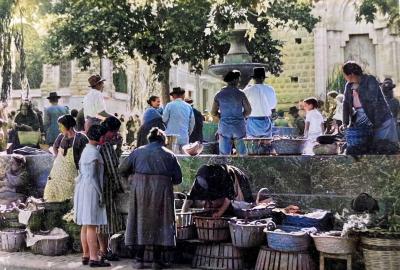What role did Mallorca play in the broader network of Mediterranean maritime trade?
Similar Topics
mallorca maritime trade
mediterranean trade network
balearic islands port
palma port city
medieval mediterranean commerce
mediterranean ship repairs
mediterranean trade hub
mediterranean cultural exchange
Mallorca, the largest of the Balearic Islands, historically held a significant role in the Mediterranean maritime trade network due to its strategic location and natural harbors. Situated in the western Mediterranean, Mallorca served as an essential stopover point for merchants and sailors navigating the busy routes between the Iberian Peninsula, North Africa, and Italy. Its capital, Palma, became a bustling port city, benefiting from the island's deep bays and sheltered anchorages which facilitated the safe docking of a variety of trading vessels.
Throughout the Middle Ages and into the Renaissance, Mallorca was an important hub for the exchange of goods such as textiles, ceramics, spices, and agricultural products. The island’s economy thrived on both the export of local products like olive oil, wine, and wheat, and its role as an intermediary trading post where goods from different parts of the Mediterranean were collected and redistributed. This exchange fostered a vibrant cultural and economic environment, making Mallorca a melting pot of Mediterranean influences.
Moreover, Mallorca's maritime importance extended beyond commerce; it was a crucial point for ship repairs and resupply, which allowed trading fleets to maintain longer voyages across the Mediterranean. Additionally, the island’s skilled shipbuilders and sailors contributed to the broader maritime activities of the region. By linking important Mediterranean markets, Mallorca not only prospered economically but also helped to facilitate cultural and technological exchanges, reinforcing its standing within the interconnected network of Mediterranean trade.
Throughout the Middle Ages and into the Renaissance, Mallorca was an important hub for the exchange of goods such as textiles, ceramics, spices, and agricultural products. The island’s economy thrived on both the export of local products like olive oil, wine, and wheat, and its role as an intermediary trading post where goods from different parts of the Mediterranean were collected and redistributed. This exchange fostered a vibrant cultural and economic environment, making Mallorca a melting pot of Mediterranean influences.
Moreover, Mallorca's maritime importance extended beyond commerce; it was a crucial point for ship repairs and resupply, which allowed trading fleets to maintain longer voyages across the Mediterranean. Additionally, the island’s skilled shipbuilders and sailors contributed to the broader maritime activities of the region. By linking important Mediterranean markets, Mallorca not only prospered economically but also helped to facilitate cultural and technological exchanges, reinforcing its standing within the interconnected network of Mediterranean trade.
🧩 Related Questions
Related Question
How do local artisans in Mallorca produce Palo liqueur differently than commercial manufacturers?
Related Question
What are the ethical debates surrounding bullfighting in Mallorca among residents and tourists?
Related Question
What role does the idea of interconnectedness play in Joan Mascaró’s mystical texts for those traveling to diverse spiritual sites?


